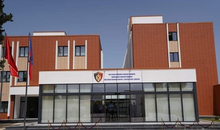
 Flash News
Flash News
Korça/ 40-year-old man jumps from fifth floor balcony, in critical condition
Croatia restores compulsory military service
Illegal constructions in Theth, Manja demands disciplinary proceedings against prosecutor Elsa Gjeli
Details from the murder of Renis Dobra, the perpetrators came with 2 Range Rover cars from Rrëshen
The Supreme Court left him in prison, Meta addresses the 'Constitution'
Payments for babysitters and the elderly reach up to 1,000 euros per month

Paying up to 1,000 euros per month, how the market for hiring nannies and elderly care workers in Albania is booming. According to mediation agencies, 70% of the requests are led by the hiring of caregivers for the elderly. Meanwhile, the number of women immigrating to Europe to work as nannies has increased. Experts raise concerns about the expansion of an informal market.
After retirement, after 40 years working as a midwife, Mrs. Tixhe Lika has been working as a babysitter for 5 years. The 66-year-old combines the work of a nanny with the qualification obtained in the health care sector.
Ms. Lika takes care of a 3-year-old child for 6 hours a day, 5 days a week, against a net monthly payment of 50,000 ALL. She says that not only the spiritual connection she creates with the child, but also with his family members, keeps him more involved in this profession.
On the contrary, as she claims, "if I felt like a stranger in the house of employees, I would abandon it as a job". After several years of experience, Mrs. Lika says that she will leave this profession when she has fulfilled her mission, to leave behind several happy families.
Not only in Tirana, but also in the districts, there are many families looking to hire nannies to raise children and women to care for the elderly.
In the period January-September 2024, at the country level, according to the data from the database of the "Key" portal and the "Professionisti" recruitment agency, 1,103 announcements were offered for the job of a nanny. Compared to the 9-month period last year, the number of announcements increased by 22%.
In 2023, the number of babysitter job announcements reached 1,203. Compared to the previous year, their number increased by 10%.
According to the managers of mediation agencies, requests for employment of nannies range from hiring a nanny to live at home with the family to weekly, part-time work or night nanny for new parents.
But the offer for the recruitment of nannies is not able to respond to the high demand, due to the increase in emigration. The coordinator of the mediation agency "Melisa", Mrs. Vali Erindi told "Monitor" that the number of employed women is increasing, for periods of 3 months or even longer, in the families of immigrants in EU countries, due to high salaries.
"In the country, the demand is high for the employment of nannies, but the supply remains low. Women prefer to perform seasonal childcare work for seasonal 3-month periods in immigrant families, mainly in Switzerland, due to the high wages compared to Albanian wages. In EU countries, salaries range from 800 to 1,100 euros.
It should be borne in mind that the job as a nanny is not long-term, since in our country it is kept until the child reaches the age to go to daycare or kindergarten. So the mentality of always having a governess in the family has not yet been created. For this reason, employees are forced to look for work with another employer, or to emigrate abroad for better wages," she says.
The "Melisa" agency, in addition to mediation for the employment of women in the care service of children and the third age, also provides free weekly qualification courses for imparting knowledge about work ethics, professionalization, etc.
Even Albana Uku, head of the Women's Mediation Agency, said that the demand for employment of women as babysitters is increasing, but due to emigration for higher wages, the supply remains low.
"Low pay is a problem for the nanny profession in Albania. The average salary reaches up to 45 thousand ALL per month. The average payment was supposed to be 60,000 ALL per month. Raising wages would curb the immigration of nannies. As a result, the offer would increase", emphasizes Mrs. Uku.
Demands for elderly caregivers are flooding in
The demographic changes of the population in 12 years have deepened the problem of population aging and the departure of young people. The increase in the number of the population at retirement age and the shrinking of the young age has significantly increased the needs for treatment services for old age.
In the period January-September 2024, in the country, according to the data from the database of the "Key" portal and the "Professionisti" recruitment agency, 6,963 announcements were offered for the job of the caregiver of the elderly. Compared to the 9-month period last year, the number of announcements increased by 43%.
For the year 2023, the number of announcements for guardian employment reached 4,829. Compared to the previous year, their number increased by 18%.
The coordinator of the mediation agency "Melisa", Mrs. Vali Erindi, said that 70% of the demand for employment is headed by caregivers for the elderly.
"This market has grown significantly and can be covered with female employees, unlike babysitters who prefer to emigrate."
From the 2011 census to the 2023 census, the number of the population from 0 to 49 years old is decreasing, while the number of the population from 50 to 94 years old has increased significantly.
According to the data of the 2023 Census, the number of the population of the age group from 85 to 89 years old has recorded the highest increase with 79% compared to the data of the Census 2011. During these 12 years, the population of the age group 65-69 years old has recorded high growth, with 63%. The population of the 80- to 84-year-old age group has increased by 75% compared to the 2011 Census. The population of the 70-74-year-old age group has increased by 36%, the 75-79-year-old age group has increased by 27% and for the 90- 94 years old, the population has increased by 24%.
While the data of the 2023 Census showed that the number of the population of the age group from 0 to 4 years has decreased by 31.6%, the age group of 5-9 years, their number has decreased by 31% and for the age group from 10 to 14 years, the decrease in the number of the population is by 41.4% compared to the census of the population in the 2011 Census.
The highest decline in the young age group for 2023 was recorded in the group from 15 to 19 years old with a contraction of 46.8%, an indicator according to experts of increasing family immigration.
The 2023 Census data also reported that around 64,000 people over the age of 60 lived alone across the country. Of the 103,000 people who lived alone, 62.5% of them were 60 years old or older (64,375 people).
For sociologist Gëzim Tushi, the increase in the number of elderly people living alone has increased the need for more social services.
"The number of elderly people abandoned by their biological family has increased (a new phenomenon that has appeared in these three decades), there is an increase in the number of elderly people who live alone and who need social services. Loneliness is a rapidly widening social scourge.
A part of those who live alone, have personal houses and pensions, but do not have the ability to perform the necessary services. They do not need residential treatment in nursing homes, but they do need minor services. A need for mobile services and community care".
The transition towards an older population is also seen in dependency ratios. The youth dependency ratio decreased to 24.0% from 30.4% estimated in the 2011 Census, and the elderly dependency ratio increased to 30.4% from 16.7% in 2011.
Analyzed at the district level, Kukësi and Gjirokastra hold opposite positions in terms of dependency ratios: Kukësi has the highest youth dependency ratio (31.8%) and the lowest elderly dependency ratio (19.9 %).
While Gjirokastra has the lowest youth dependency ratio (19.0%) and the highest elderly dependency ratio (46.1%). The average age of the population is 42.5 years, from 35.3 years in the 2011 Census.
The influencing factors of births, deaths and international/internal migration brought about the change in the structure of the population, in the 2023 Census.
Analyzing the 50-69 age group in the population pyramid, an expansion is observed that coincides with a period of births between the mid-1950s and 1970s. Albania during this period was characterized by an increase in birth rates, known as "baby boom".
Low fertility rates and the downward trend, combined with the emigration of the reproductive age population resulted in a narrowing of the base of the population pyramid. Fertility below replacement level since 2001, increased life expectancy, and migration remain the main factors of population aging.
Families looking to hire a nanny or elder care worker have a set budget available, for which, in some cases, even the most employed will agree on a salary, regardless of the salary guidance received from the placement agency. .
But even though the salary negotiation between employees and employers is not excluded, there is a control over the price structure and rate by the mediation agencies.
According to the data received from the agencies, for an experienced nanny, the net monthly payments range from 45-47 or 50,000 ALL to 60,000 ALL. The working conditions for benefiting from these payments include caring for a child, 8 hours a day, 5 days a week.
If the employee will take care of two children, the monthly payment reaches up to 80,000 ALL. In some cases, according to sources from the market, the payments are even 5 euros/hour or up to 1040 euros per month, for 5 days of the week, 8 hours.
Families that employ nannies through agencies must pay a commission in the amount of 10-60 to 100% of the employee's monthly salary. The commission to the agency is paid only once.
Over the years, payments for nannies have shown an upward trend. According to data obtained from the women's employment market in this sector by mediation agencies, after the period of the Covid-19 pandemic, payments for childminders within the country have increased by 50 to 80%.
Payments for nannies hired abroad start from 800, 1,000 and up to 1,100 euros. On social networks, you come across many announcements for the employment of nannies or employees for the care of the elderly from immigrant families living in Switzerland, Germany or Belgium.
Employment requirements for the performance of these services outside Albania, in most cases, include as a main condition the 24-hour stay of the employee at home, offering free accommodation and food.
While the payments for the caregivers of the elderly, according to the data of the agencies, start from 45,000 ALL per month for the elderly without concomitant diseases and reach up to 85,000 ALL per month, if the elderly person is paralyzed or has other diseases. Part-time work for elderly care is paid up to 1,500 ALL/hour.
The job market for caregivers, completely informal...
The nanny profession in Albania started from the need to employ many women employed in the former enterprises of the communist system. After the 90s, a period in which the political-economic transformation of the country was accompanied by the dissolution of a number of former state-owned professional enterprises, resulted in many women being unemployed.
In addition, the development of the free enterprise market, after the decline of the nationalized economy, strengthened the demand of entrepreneurial families to have child governesses at home. The employment time was longer.
The nanny needed to live at home until the child started primary school. Although a stable pattern of employment for this profession was apparently developing, high informality prevailed.
Shpresa Tabaku, now retired, says that she started the nanny profession in the first years of democracy, living as an employee with an entrepreneurial family for a payment of 40,000 lek per month.
"The payment was high for the time, but it was informal," she claims. Due to many years of uninsured work or work "in the dark", Ms. Tabaku today benefits from a pension in the amount of 10,000 Lek.
Later, in the 2000s, with changing lifestyles, wealthy families in Albania began hiring foreign nannies, especially from the Philippines, who lived in the employers' homes. In addition to the children, the employees also took care of the smooth running of the house.
Since 2019, the market for the recruitment of child and elderly caregivers has been organized with the employment model through intermediary agencies. Interested families can turn to mediation agencies for staff employment.
But the agencies only guarantee mediation for employment, since for these professions it is still not necessary to sign a labor contract and employees are not paid social and health insurance.
Although the demand for nannies from local families has increased currently, according to Albana Ukut, head of one of the mediation agencies, their employment is not for long-term periods and the employees are without employment contracts. So their employment continues to remain in the dark.
Erald Pashaj, administrator of EPPC Albania and Kosovo, specialized in the field of staff training and development, said that in Albania the market for the employment of nannies or guardians of the elderly is completely informal, also due to legislation.
"A family that hires for this type of service is unable to provide the employee, as it needs to function as a business, registered with NIPT.
The only ones who manage to secure these employees are entrepreneurial families. If an entrepreneurial family hires a caregiver, it registers him as an employee through his business. Their number is very few.
Therefore, not only the employment market of nannies and family caregivers, but also the employment of drivers in the family are informal employments, they are informal.
The legislation enables the formalization of employees only if the market is developed through genuine employment agencies that have the obligation to conclude a work contract and pay social and health insurance contributions.
There are no proper employment agencies in the country for these types of service, through which the employment contract and social and health insurance payments can be made possible. While mediation agencies cannot formalize this labor market, as their object of activity is mediation".
Economist Romina Radoshniqi also said that this labor market operates informally in Albania, where employees face job insecurity and low wages.
"The market is informal and unregulated. Both parties, the employer and the employee, are vulnerable and at risk (since there is no employment contract). The formalization of this labor market is difficult, because the responsible bodies find it difficult to track it.
Agencies offer more security for the service they provide to the client, employees are protected with an employment contract, as it is a developing market and salaries are high.
However, in addition to the challenges faced by nannies and caregivers of the third age, we can say that they have had positive effects on family finances, since the employees are mainly women who do not have many employment opportunities".
Sociologist Gëzim Tushi also emphasizes that this market (nannies or carers) must be regulated and it is especially urgent to control the skills and disposition to provide services to the elderly through a process of monitoring the skills and recognizing the specific standards for this age./MONITOR
Latest news


Malltezi: SPAK admits, we are in a process that began with Balla's false report
2025-07-10 22:34:16

Si të çliroheni nga bllokimet emocionale me anë të ushtrimeve
2025-07-10 21:57:24

Lala: Veliaj wanted to return as mayor
2025-07-10 21:40:46

VIDEO/ Brawl in Bolivian parliament, deputies physically clash
2025-07-10 21:20:30


Albania experienced one of the longest heat waves of the last decade
2025-07-10 21:01:09

The Government approves new procedures for declaring residence in e-Albania
2025-07-10 20:39:32

Koka: Northerners will not forget Edi Rama's racist operation in Theth
2025-07-10 20:18:24
The 3 zodiac signs that will be most affected by the 'Full Moon' of July 10
2025-07-10 20:04:49
New director of the National Center of Cinematography appointed
2025-07-10 19:51:12
Korça/ 40-year-old man jumps from fifth floor balcony, in critical condition
2025-07-10 19:40:19
'Tired Woman'/ The Syndrome That Affects Thousands of Women Every Day
2025-07-10 19:34:02
Jane Birkin's original Hermès bag sells for $10 million
2025-07-10 19:26:22

Britain-Ukraine agreement signed for 5,000 Thales missiles
2025-07-10 19:00:25
Fire in Zvërnec, flames endanger two hotels
2025-07-10 18:57:19
Croatia restores compulsory military service
2025-07-10 18:39:01
Spahia: The great truth of the strong accusation of the residents of Theth
2025-07-10 18:35:07


The Supreme Court left him in prison, Meta addresses the 'Constitution'
2025-07-10 17:57:21
New punishment with 'new' regulations
2025-07-10 17:54:46
EU translator fired over fears for Zelenskyy's safety
2025-07-10 17:45:37
'You are a policeman, but not God, take my soul', protest for Agon Zejnullahu
2025-07-10 17:41:21


Video/ Rama repeats the scenario, kneels before Meloni again
2025-07-10 16:56:31
He set fire to a plot of olive trees, 50-year-old man arrested in Shijak
2025-07-10 16:46:19

Rubio: US and Russia have exchanged new ideas for Ukraine peace talks
2025-07-10 16:36:20
Death of 27-year-old, Lipjan Police Commander Resigns
2025-07-10 16:21:28
Video/ An apartment burns in Tirana near the New Bazaar
2025-07-10 16:09:36


Jensila lights up the internet with her birthday greetings to Ledri
2025-07-10 15:42:08
They're full of pesticides! List of 12 products we need to be careful of
2025-07-10 15:31:04

Worker falls from scaffolding in Shëngjin, urgently sent to Trauma
2025-07-10 15:11:03
Malltezi: Within one day they seized my accounts, properties and shares
2025-07-10 15:01:23
EU: Israel has agreed to more aid to Gaza
2025-07-10 14:55:19


Murder of Reni Dobra, 23-year-old's vehicle pulled from the water
2025-07-10 14:29:23
Trump's tariffs on Brazil raise coffee prices
2025-07-10 14:16:07
Ursula von der Leyen survives no-confidence vote
2025-07-10 14:04:27


Fire in Lezha, flames near electrical substation
2025-07-10 13:32:24
Residents clash with police in Theth, a woman faints
2025-07-10 13:24:38
"Rama and Xanun"
2025-07-10 13:15:46

Zodiac signs most likely to get divorced in July 2025
2025-07-10 12:45:51
A scapegoat for an illegitimate Republic
2025-07-10 12:35:02
"He has devastated his own nation"/ Berisha: Rama imprisons his opponents!
2025-07-10 12:26:54

Albanian man injured with knife in Italy
2025-07-10 12:08:55






23-year-old in Mat drowned with rope, 4 suspects are being held
2025-07-10 10:58:53

After the dismissals, the new director of the Shkodra Police is appointed
2025-07-10 10:30:10
BIRN: Rama's action for public spaces, a repeated spectacle
2025-07-10 10:29:11
Action in Theth, Shkodra Police leaders dismissed
2025-07-10 10:16:28
Fatal accident on the Tirana-Durres highway
2025-07-10 10:01:58
The incinerator does not exist, but the government continues to increase funds
2025-07-10 09:51:45
Albania is aging at a rapid pace! 30% of the population is over 60 years old
2025-07-10 09:46:23
End of an era, Modric says 'goodbye' to Real Madrid
2025-07-10 09:36:09
Mount Dukat has been on fire for 6 days, residents request air intervention
2025-07-10 09:27:24

"Poverty on the rise"/ DW: Many people in Germany are not getting paid
2025-07-10 09:08:06
Horoscope, what do the stars have in store for you today?
2025-07-10 08:51:59




The scorching heat returns, the thermometer climbs to 40°C
2025-07-10 07:58:52
Morning Post/ In 2 lines: What mattered yesterday in Albania
2025-07-10 07:46:35
Tourist operator in Theth: They are demolishing our houses without warning
2025-07-09 22:54:57

Trump and Israeli commander warn: Gaza ceasefire could be near
2025-07-09 22:13:21
Fire in Elbasan Landfill, pedagogue: It is a cancer and environmental crime
2025-07-09 21:54:47


Dangerous summer, number of snake bites increases
2025-07-09 21:22:13
Berisha appeals again: Stop state terror against the residents of Theth!
2025-07-09 21:15:36
'Kissing disease' virus linked to several forms of cancer
2025-07-09 21:04:44
Malltezi confesses after release: Justice has become a political weapon
2025-07-09 20:51:48
Vokshi: Albania's EU integration has stalled due to lack of free elections
2025-07-09 20:37:21
